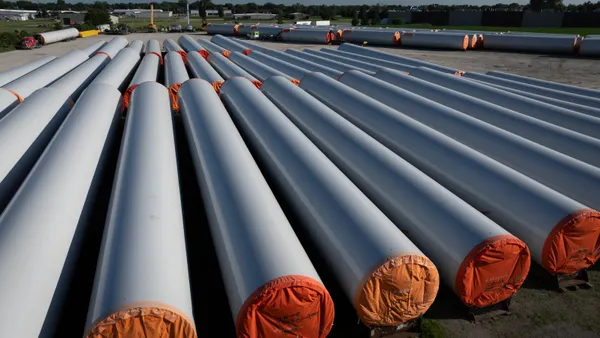Dive Brief:
- As many as 2.7 million construction positions could be replaced by machines by 2057, a recent study from the Midwest Economic Policy Institute (MEPI) found.
- The study claims about 49% of all construction jobs can be automated, which would save time and money. Specifically, the report found, there is automation potential for about 50% of carpenters’ jobs, 42% for electricians, 50% for plumbers and 88% for operating engineers. The replaced workers, including 435,000 carpenters and 404,000 operating engineers, could reduce labor costs by $31.5 billion in present-day dollars.
- The MEPI report also offered policy recommendations to help create a potential roadmap for dealing with increasing automation and how it will affect the workers it replaces. The study's authors suggested adapting apprenticeship programs to focus more on aiding implementation of automated construction work. The report also urged local governments to collaborate with educational institutions for retraining programs.
Dive Insight:
MEPI, a research organization focused on infrastructure and construction issues in Midwestern states, reports that jobs traditionally done by skilled laborers are being completed more quickly via automation, with multiple robotic brick layers, for example, capable of placing thousands of bricks a day, compared to a manual laborer, who averages about 500 bricks a day. The organization found that the number of workers displaced by 2057 could reach 96,000 in Illinois and 55,000 in Minnesota.
“Advancements in technology have already dramatically re-shaped American manufacturing and eliminated millions of blue-collar, middle-class jobs,” said study co-author Robert Bruno. “Similar changes are already underway in the construction sector, and it is vital for policymakers to begin thinking about ways to embrace progress without leaving middle-class workers behind.”
Robots are even breaking into the manufacturing aspects of construction, such as prefabrication and offsite building. Z Modular, a modular unit manufacturer, announced it has commissioned autonomous robots to accelerate the process of producing modular units.
The equipment allows a team of nearly 200 tradespeople, engineers and operations managers to complete up to 80% of the total construction of a project within the factory, the company says. The facility is currently producing modules for apartments and hotels.
In the immediate future, though, construction jobs may not be directly replaced by automation or robots, but rather supplemented by them. Drones capturing BIM information and data offer a good example of this, as do autonomous robots doing laser scanning. These types of workforce boosts free up construction managers onsite to focus on other work. Robots continuing to replace skilled labor onsite could help actualize the move toward workers onsite simply monitoring robots while they do most of the work.














